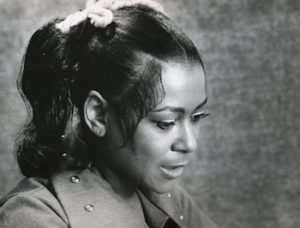
Sylvia Robinson
*Sylvia Robinson was born on this date in 1935. She was a Black singer and music producer.
Born Sylvia Vanderpool in New York City, she made her first record when she was 14, backed by the veteran jazz trumpeter 'Hot Lips' Page. By the time she enrolled at Washington Irving High School, she was already singing and attracting the attention of Columbia Records. Through the early 1950s, she recorded, sometimes as Little Sylvia. She met session guitarist Mickey (McHouston) Baker, and the two began working together musically as Mickey & Sylvia. In 1956, Mickey & Sylvia were signed to RCA and released "Love Is Strange," a catchy song with a humorous seduction dialogue between the two vocalists.
It was written by rock-and-roll guitarist Bo Diddley but credited to his wife, Ethel Smith. "Love Is Strange" was a hit on both rhythm-and-blues and pop charts, and artists ranging from Paul McCartney to Kenny Rogers and Dolly Parton later covered the song. Mickey & Sylvia lasted until 1961, creating moderate hits such as "There Ought to Be a Law" and "Baby You're So Fine." They also backed the rising R&B duo of Ike & Tina Turner in 1961's "It's Gonna Work Out Fine."
In 1964, Sylvia married Joseph Robinson, a real estate agent. He gave up his career to become her manager. The Robinsons settled in Englewood, New Jersey, and opened their new Platinum record label in 1968. With their in-house recording studio, Soul Sound Studios, the label did well enough to launch several subsidiaries and releases, including "Love on a Two-Way Street" (1970).
Perhaps All Platinum's most successful release featured Sylvia Robinson on vocals, "Pillow Talk" (1973). The song was awarded a gold record (for sales of 500,000 copies) and was a standard on compilations of 1970s music for years afterward. Robinson recorded an album, Sylvia, in 1976. By the decade's end, the hits had dried up, leaving All Platinum in dire financial straits. The company had already filed for Chapter 11 bankruptcy when Robinson was taken to the New York club Harlem World for her birthday in 1979.
Robinson witnessed an early stage of the RAP phenomenon, with a DJ improvising rhymes over instrumental mixes of dance recordings and perhaps manipulating the tapes themselves. "All of a sudden, a voice said to me, 'If you put a concept like that on wax, you'll be out of all the trouble you're in," said Robinson. That summer, Robinson encountered new music once again. In an Englewood pizzeria, she heard Henry Jackson, known as Big Bank Hank, rapping over the music on the restaurant's sound system. Robinson asked him if he wanted to record. Jackson was quickly teamed with two other local rappers, high school student Master Gee and flower salesman Wonder Mike, and the Sugarhill Gang was born.
The group was named after the Robinsons' new label, Sugar Hill, which was named after an elegant section of Harlem, New York. Former Roulette Records owner Morris Levy, a cutthroat New York recording scene veteran, partly bankrolled the label. In Robinson's studio, the Sugarhill Gang recorded the hip-hop genre's debut 12-inch single, "Rapper's Delight." That 15-minute record gave hip-hop its name, with Sylvia Robinson playing bass.
Within a few months of releasing "Rapper's Delight" in October 1979, the Sugarhill Gang was opening for Funkadelic and appearing in Europe. Robinson was keeping watch over a 24-hour-a-day production schedule at Sugar Hill. She and her husband signed several more talented rappers to their new label. These included Funky 4+1, Spoonie Gee, and, most importantly, Grandmaster Flash and the Furious Five.
For Sugar Hill's youthful artists, Robinson played the mentor role, but by the mid-1980s, the label faced heavy competition. A distribution deal with the large MCA label dissolved in an acrimonious lawsuit, and Robinson's long run of hitmaking was over. Rights to the Sugar Hill catalog were sold to the Rhino label in 1995. Robinson faced other problems in her later years. In 1999, she launched a lawsuit against Blaze magazine, contending that the publication had unfairly accused her of cheating Sugar Hill artists out of their proper royalties.
Joseph Robinson died in 2000, and she was reportedly devastated by a fire that leveled the historic Sugar Hill studios in 2002. But The Vibe History of Hip-Hop and other accounts of hip-hop's early days were beginning to take note of her pioneering role, rooted in decades of involvement with the popular black musical scene. Sylvia Robinson died of congestive heart failure in New Jersey on September 29, 2011.